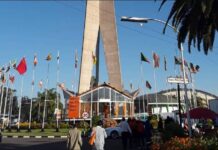
By Sinikiwe Marodza
VICTORIA FALLS, – As Zimbabwe prepares to host the 15th meeting of the Conference of the Contracting Parties to the Convention on Wetlands (COP15) in Victoria Falls this month, a new report has issued a stark warning: the world’s wetlands are disappearing at an alarming rate, placing an estimated US$39 trillion in economic and social benefits at risk.
The “Global Wetland Outlook 2025,” released yesterday by the Convention on Wetlands, indicates that without urgent global action, a fifth of the planet’s remaining wetlands could be lost by 2050. Wetlands, which include marshes, rivers, mangroves, and coral reefs, are critical ecosystems. They provide essential services like clean water, food, flood protection, and carbon storage, which the report values at more than 7.5% of the world’s GDP, despite covering just 6% of the Earth’s surface.
According to the report, 22% of these vital areas have been lost since 1970, with the most severe recent declines occurring in Africa, Latin America, and the Caribbean.
Dr. Musonda Mumba, Secretary General of the Convention on Wetlands, said the world is failing to protect these crucial assets. “Wetlands bankroll the planet, yet we are still investing more in their destruction than in their recovery,” said Dr. Mumba.
“The world is sitting on a $10 trillion opportunity—restoring wetlands could unlock these benefits, but we’re running out of time.”
The report is the most comprehensive assessment of global wetlands to date, providing policymakers with the latest data on the immense cost of their destruction and a roadmap for their conservation and restoration.
Dr. Hugh Robertson, the lead author of the report and Chair of the Convention’s Scientific and Technical Review Panel, stressed the urgency of the situation.
“Wetlands are not a marginal issue. They are fundamental to the water cycle our planet depends on, for our global response to climate change, and are essential for the well-being of billions of people,” said Dr. Robertson.
“The scale of loss and degradation is beyond what we can afford to ignore.”
As the host nation for the conference scheduled for July 23-31, 2025, Zimbabwe will assume the COP presidency for the next three years, placing it in a key leadership role to guide global discussions on wetland management. The conference is seen as a significant opportunity for the country to showcase its conservation efforts, such as the Monavale Vlei, and to foster international partnerships.
The report highlights that prevention is more cost-effective than restoration. The Global Wetland Outlook proposes four key pathways to reverse the trend: integrating the value of wetlands into economic planning, recognizing their central role in the global water cycle, using innovative financing like carbon markets, and mobilizing public-private partnerships to fund restoration.
With all eyes on Victoria Falls, the international community will be looking to the COP15 conference to deliver decisive action to protect these indispensable ecosystems for future generations.










